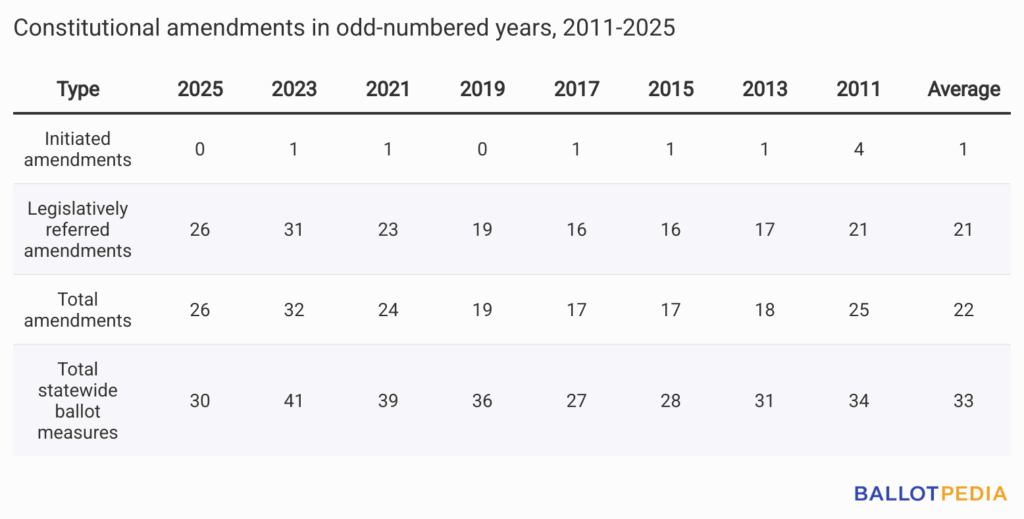In 2025, voters in California, Louisiana, New York, Ohio, Texas, Washington, and Wisconsin decided on 26 constitutional amendments sent to state ballots by their respective state legislatures. Voters approved 22 amendments and defeated four, all of which were in Louisiana.
This year saw the second-highest number of amendments among odd-numbered years from 2011 to 2023, surpassed only by 2023, which had 32. As a percentage of the total number of statewide ballot measures in 2025, constitutional amendments made up 87% of the 30 total measures — the highest percentage for that period. It is also above the average number of amendments featured, which was 23.

The 22 amendments added on average 541 words per amendment to a state’s constitution ranging from 10 words for a Texas amendment authorizing a tax exemption for income-producing property to 1,102 words for another Texas amendment that established a special state fund for the state Technical College System. The amendments also removed, on average, 31 words, with a Texas amendment that made changes to the state judicial oversight commission removing the most, with 318 words removed.
Altogether, the six affected state constitutions became 5,859 words longer in 2025. The Texas Constitution grew the most, increasing 4,265 words. The second most was Ohio, which passed an amendment in May that increased the constitution by 1,033 words.
The amendments addressed redistricting in California, administration of state investments in Washington; land use in New York; state tax policy, judicial structure and vacancies, and juvenile sentencing in Louisiana; a bond issue in Ohio; and a variety of topics in Texas. On average, the amendments received support from 63% of voters and opposition from 37%.
Texas ballots featured the greatest number of constitutional amendments, with 17. The topics included prohibiting certain future taxes, establishing parental rights, increasing or creating new property tax exemptions, and prohibiting noncitizens from voting in state and local elections. All 17 constitutional amendments were approved, with support ranging from 57% to 89%. The average approval rate was 70%.
Two amendments in Texas added or amended the state’s Bill of Rights. Proposition 3 amended the section governing the right to bail and the rules governing that right. It required judges or magistrates to deny bail to individuals accused of certain violent or sexual offenses. It was approved with 61% of the vote. Proposition 15 added a new section to the state’s Bill of Rights to provide that parents have the right "to exercise care, custody, and control of the parent’s child, including the right to make decisions concerning the child’s upbringing" and the responsibility "to nurture and protect the parent's child." It was approved with 70% of the vote.
Six of the amendments appeared on ballots before November, including the four amendments that were defeated in Louisiana in March, an amendment in Wisconsin to require voter photo ID in April, and a local public infrastructure bond in Ohio in May.



